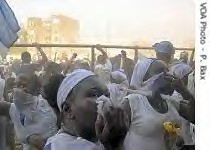
Guinea opposition forces mobilize against President Lansana Conte. A general strike has been called in the country resulting from electoral fraud.
Originally uploaded by Pan-African News Wire File Photos.
By Dino Mahtani in Lagos
January 19 2007 17:09
A general strike called by unions in Guinea aiming to oust President Lansana Conté has started to disrupt the country’s large bauxite industry, and is seen as a serious threat to stability in west Africa.
Unions called the strike almost a fortnight ago in protest at Mr Conté’s increasingly erratic rule. Protests have hit towns across the country and a small number of people have been killed in clashes between protesters and security forces. Riot police in Conakry, the dilapidated oceanside capital, have been out in force.
For the first time on Friday the strike began halting trains carrying bauxite, the raw material used for aluminium, to the port of Kamsar, where loadings have been reduced. Guinea is the world’s biggest exporter of bauxite, and holds a third of the world’s reserves.
Several international mining companies, including Alcoa and Rusal, the world’s two largest primary aluminium producers, have operations in Guinea.
Mining companies could face prolonged disruption to operations if the strike continues, or regulatory and contract reviews if the regime falls.
Mr Conté, the septuagenarian, chain smoking diabetic, who came to power in a bloodless coup 23 years ago, has been criticised by unions for his corrupt and personalised grip on power.
Last month, he infuriated civil activists when he freed two political allies, including the country’s richest businessman, incarcerated during a corruption probe.
Unions have criticised Mr Conté’s cabinet reshuffles, intended to strengthen his close allies. In one case he reversed the dismissal of a government minister related to his second wife, under pressure from her family’s political faction.
Unions say Mr Conté, whose presidential term expires in 2010, is not physically fit to run the country. They say his health problems, which forced him to seek medical treatment in Switzerland last year, are incapacitating him.
Analysts say the strike, the third in a year, could yet degenerate into deadlier clashes between protesters and security forces and could precipitate a coup by a military split along ethnic and generational lines.
The fear is that a deepened crisis could spill across borders into neighbouring countries such as Liberia and Sierra Leone, which are recovering from devastating wars, and also into Ivory Coast, which is already split in two by rebels and the government.
Analysts and some diplomats feel the situation in Guinea is not set to reverse easily unless the president appoints a prime minister to administer a national unity government.
“Only a government whose members have not been chosen by President Conté’s wives, or cronies looking to the sick president’s succession, will have the necessary legitimacy to negotiate a resolution with the unions,” said Gilles Yabi, an analyst at International Crisis Group.
Guinea, ranked as Africa’s most corrupt country by Transparency International, has nevertheless received €118m ($153m) from the European Union, which resumed aid after a three-year gap because the government began implementing some economic and political reforms.
Copyright The Financial Times Limited 2007
No comments:
Post a Comment